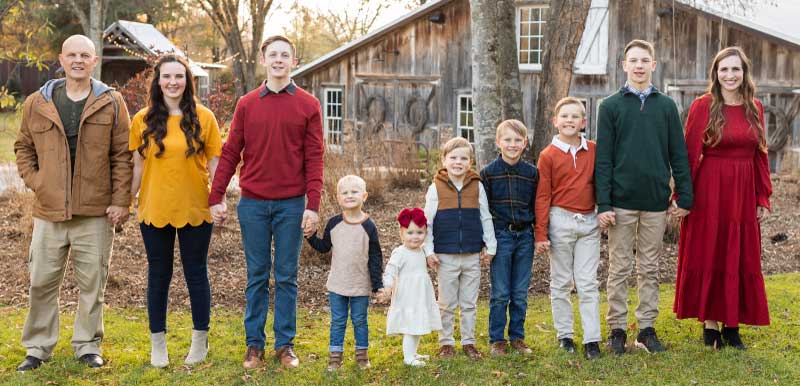I am one of seven children. I married a girl who has seven siblings. We both enjoyed and benefited immensely by growing up in large families, despite the many challenges and difficulties that come with having to share almost everything (including one-on-one time with parents), limited financial resources, and other aspects of growing up in a large household.

Now, after 20 years of marriage, my wife and I have eight children of our own. On nearly a daily basis we have many reminders that our family is uniquely large. Two kids ago we had to upgrade from an 8-passenger Toyota Sienna to a 13-passenger Ford Transit. One of our kids made the observation when we bought the Transit that, “Now we’re going to be known as the family in the big, white van.” He was right.

We take up an entire pew at church on Sunday. At baseball games, it’s not rare to see people counting our kids as we corral them through the entrance gate and into an area of the park where they can be out of the way of people who don’t want to be distracted by the playfulness of little kids. Sometimes we can be overwhelming, especially to people who are not used to having lots of kids around.
It’s clear from the fertility and family size trends in the United States over the past century that having children is becoming a lower and lower priority for most Americans.
While family size is decreasing among Latter-day Saints, it is still higher than other religious groups. In 1981, LDS families had a fertility rate of 3.31 compared to the national average of 1.81. More recent studies show the average number of kids in the home for LDS couples at close to 3, whereas the typical household has 2 children.
Despite economic and cultural influences to the contrary, Latter-day Saints clearly are motivated to have more children.
Among some of our Latter-day Saint peers, our family doesn’t seem quite so large. We have many LDS friends who have 10, 11, even 12 kids. As the breadwinner for my own large family, I don’t know how people manage things when they reach double digits. They figure it out. They make do.
Those of us with large families are certainly outliers compared to the average American family. In the modern age, it is rare to see couples with more than three kids. Heck, most relationships don’t even stay together long enough to produce more than one or two children. On the other hand, the “most Mormon” of families (the ones who are more zealous for their faith) often have five children or more, even in a financial environment that has progressively maxed out breadwinners, taking the mom out of the home more often than in previous generations.
What produces this disparity among so many Latter-day Saint families compared with the rest of society?
Last fall when I was in line with my two oldest boys waiting to get them into an airsoft competition, I got into a conversation with a father behind me who was registering his son. The topic of how many kids naturally came up, and I told him that I had six sons. His next question to me was a sarcastic one similar to what I’ve heard from sports coaches, the security guy at the airport, and several other random strangers: “You know what causes that, right?”
My response to this guy surprised him: “Yes, reading the Bible. You ought to try it.”
I don’t know whether this fellow understood the gist of what I was saying. He seemed a little perplexed at my response. If you’re reading this and don’t follow why reading the Bible would cause a person to have a large family, I’ll explain.
The Bible’s Perspectives on Child-bearing and Family Size
The Bible makes clear that God expects his children to multiply and replenish the earth. The first commandment given to Adam and Eve, believed in the Christian world to be the first parents of all humans, was this: “Be fruitful, and multiply, and replenish the earth, and subdue it.”
Be fruitful, and multiply, and replenish the earth… – Genesis 1:28
Many other verses in the Bible directly support the idea that God wants couples to have children. Here are some of those verses.
3 Lo, children are an heritage of the Lord: and the fruit of the womb is his reward.
4 As arrows are in the hand of a mighty man; so are children of the youth.
5 Happy is the man that hath his quiver full of them: they shall not be shamed, but they shall speak with the enemies in the gate.
Children’s children are the crown of old men; and the glory of children are their fathers.
The major characters in the Bible were family people. Abraham welcomed the blessing from God that he would become “a father of many nations” as the Lord promised him a fruitful posterity.
Abraham’s grandson, Jacob, better known as Israel, had 12 sons, through whom the covenants of Abraham were perpetuated.
The prevailing attitude of the Bible is clearly one in which righteous men and women sought for offspring, oftentimes going to great lengths and demonstrating great faith in order to be blessed with children.
The Doctrine of Family in the LDS Church
The doctrine of The Church of Jesus Christ of Latter-day Saints is unique when it comes to family life and children. Although Christians in general tend to have more children than people who are non-religious, the LDS Church’s teachings about the role of the family gives us a perspective on kids that goes beyond what is taught in most of modern Christianity. For Mormons, one of the most important priorities for life is to fulfill that first commandment given to Adam and Eve in the Garden of Eden to be fruitful and multiply replenishing the earth with posterity.
But there is something deeper and more motivating for Mormons that causes us to want more children.
For Latter-day Saints, having lots of children isn’t just about fulfilling that important commandment. Just as important, we expect that our family relationships, including husband and wife, parents and children, will last (in many ways similar to how they exist now) beyond death and into the eternal world. That expectation motivates us to welcome into our home more children than we would if we didn’t hold to that belief. We understand that creating a parent-child relationship with each of the children who we’re privileged to raise is an investment in relationships that are eternal.
This attitude towards our children is captured in a scripture wherein God describes his purpose, which explains clearly where his priorities lie.
This is my work and my glory, to bring to pass the immortality and eternal life of man. – Moses 1:39
God, being perfect, omnipotent and omniscient, continues in his position as Patriarch to the human race to gain satisfaction and glory through His offspring. Creating children and influencing those children to make good decisions that lead them to become like Him is what God’s existence is all about.
Just as all mankind is made in the image of God, families are also representative of how associations exist in eternity. Non-Mormons may be surprised to learn that our doctrines include the belief God is married, that we are spirit children of Heavenly Parents, not just a single male Parent. As one our hymns explains, “In the heavens, are parents single? No, the thought makes reason stare. Truth is reason. Truth eternal tells me I’ve a Mother there.”
Another unique aspect of Latter-day Saint theology that motivates us to be parents of several children is our understanding of the pre-mortal life. The Church of Jesus Christ of Latter-day Saints is the only Christian belief system I’m aware of that teaches that people exist as spirits prior to their birth to parents on earth. It naturally follows from that belief that it’s better for children who are waiting their turn to experience mortality to be born and raised in a home where the principles of the gospel are taught and in an environment that helps those children reach their potential as disciples of Jesus Christ. Latter-day Saints believe that the principle of foreordination applies to many aspects of a person’s mission in life, including into which family that person is born.

Parenting: A Partnership with God
When my wife and I were in our first year of marriage, we were impressed to make a mutual commitment not to infringe upon our ability to bring children into our home, a place of refuge and instruction we intentionally set up to teach the gospel of Jesus Christ as best we know how. As I mentioned earlier, we now have eight children. It feels like our family is complete, but we don’t know for sure. Each time we have a child, it’s hard to comprehend not having that child as part of our family.
In return for our commitment to keeping God’s first commandment, we also expected that He would provide a way for us to financially provide for and otherwise care for and nurture those children. He has done that for us.
My wife and I started building internet-based businesses when we were newlyweds. I sincerely feel like the inspiration we received to start and grow those businesses came from our commitment to partnering with God to raise His children the way he wants them raised. Our businesses have grown such that, once we’ve got them off the ground, they don’t need much daily involvement to keep them profitable. After selling our ecommerce stores over the past several years, I have been working on businesses that involve blogging about technology and aspects of prosperity (including discussing how to raise a large family). Running those businesses has freed me up to be highly available to my wife and kids, helping with everything from keeping the house in order (as much as that’s even possible) to running kids to activities to coaching sports to helping them develop their musical talents and learn how to work hard.
My oldest child, Maylee, is an aspiring musician. We use music extensively as part of our family dynamic and for learning and worship.
This is a song she recorded recently with the help of two of her younger brothers.
Having a Large Family Requires Lots of Faith and Effort
Understanding that it’s important to give as many children from the pre-mortal realm as possible the opportunity to be born into a Christ-centered home, and motivated by the desire to develop family relationships with kids, I’ve found that it’s important to recognize that there are ultimately limitations on what my wife and I can do, while also maintaining faith and being open to whatever God has planned for our family.
If I had a say in how things operated in this life, I’d have recommended giving parents a few extra hours each day for each new child they bring into their home. That idea clearly didn’t make the list for how our lives operate.
I find it ironic that, while there are significantly more resources required to raise more children, the amount of time parents have to spend working to secure those resources is dramatically reduced with each additional child that’s brought into the home.
Years ago when I only had two boys, I’d only spend 20-30 minutes in a day throwing batting practice. Now, with six boys (in addition to my daughter who doesn’t even play baseball or softball wanting to jump in once in a while to get some hitting reps), I find myself throwing pitches for almost two hours during one of our practice sessions.
That same kind of thing happens in many different areas of our lives. We’ve found out that the two-parent family system tends not to be very scalable. While we do our best to give each of the younger children the same opportunities their older siblings have had, the reality is that there are only 24 hours in a day, and those hours have to be divided among eight kids.
While there are times when I wonder how in the world our family became so overwhelming, I have moments every day where I find myself content that what my wife and I have built is more important than any other personal pursuits I could have gone after as an alternative. When I see my kids playing with each other, loving each other, and developing strong relationships that I’m hopeful will last throughout this life and into the next, I’m grateful for the doctrine of eternal families and the motivation it has given my wife and me to intentionally create a large family.














